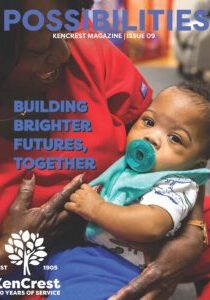On July 4, 2025, President Donald Trump signed H.R. 1 — the Budget Reconciliation Act — into law. Framed as a cost-saving measure, the legislation is projected to cut nearly $1 trillion from Medicaid over the next decade, leaving 17 million fewer people insured by 2034, according to the Congressional Budget Office.
For people with disabilities, and the families and providers who support them, this bill raises serious concerns. At KenCrest, we believe in person-centered care that empowers individuals to thrive. Medicaid is the foundation of that care. These cuts and policy changes threaten the stability of services that millions rely on — including those we serve every day.
What’s Changing?
1. Limits on State Financing
States fund the non-federal share of Medicaid through general funds, provider taxes, and local contributions. H.R. 1 gradually reduces the allowable provider tax rate from 6% in 2028 to 3.5% by 2032. This change will force states to find alternative funding or risk cutting services.
2. New Work Requirements
The law imposes work-related conditions on Medicaid applicants and enrollees aged 19–64 in the ACA expansion group or under a waiver. Individuals must complete 80 hours per month of work, community service, or a work program; earn income equal to minimum wage for 80 hours; or be enrolled part-time in an educational program. These activities can be combined, and seasonal workers may qualify based on six-month average income. Exemptions apply to medically fragile individuals (including those with I/DD), caregivers for disabled individuals or dependents, and parents of children under 13. The policy takes effect by December 31, 2026, with possible extensions to 2028 for states making good faith efforts to comply.
3. Regulation Moratorium
H.R. 1 delays implementation of two key HHS rules designed to streamline Medicaid, The Children's Health Insurance Program (CHIP), and related program eligibility and enrollment processes until September 30, 2034. These rules were written to reduce coverage loss by prohibiting in-person interviews for individuals with disabilities and increasing eligibility checks for beneficiaries with disabilities.
4. Delays in Home and Community-Based Services (HCBS)
The bill also threatens access to expanded HCBS, which are essential for seniors and people with disabilities to live independently. These services are often labeled “optional” and are typically the first to be cut during state budget shortfalls. Without them, many individuals may be forced into more expensive institutional care, potentially violating the Americans with Disabilities Act by denying their right to live in the least restrictive setting.
Why It Matters
At KenCrest, we support over 5,000 people across Pennsylvania, Delaware, and Connecticut. For many, Medicaid is more than insurance — it’s a lifeline. It funds the direct support professionals who assist with daily living, the therapies that help children grow, and the employment programs that open doors to independence. H.R. 1 isn’t just policy — it’s personal.
What You Can Do
Now more than ever, we must raise our voices. Stay informed. Contact your legislators. Share your story — or the story of someone you love — about how Medicaid makes a difference. Advocate for policies that protect and strengthen services, not weaken them.
At KenCrest, we remain committed to building a system that values every person, regardless of ability. Together, we can ensure that progress isn’t reversed and that everyone has the opportunity to live a full and meaningful life.
To learn more or get involved, visit KenCrest.org/advocacy or contact our Director of Government Relations and Advocacy, Chip Riddleberger at chip.riddleberger@kencrest.org.

